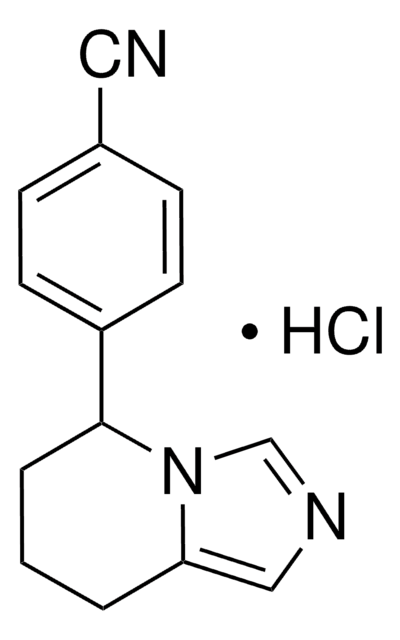PZ0006
Exemestane
≥98% (HPLC)
Sinónimos:
6-Methyleneandrosta-1,4-diene-3,17-dione
About This Item
Productos recomendados
Quality Level
assay
≥98% (HPLC)
form
powder
optical activity
[α]/D +250 to +300°, c = 1 in methanol
color
white to off-white
solubility
DMSO: ≥20 mg/mL
storage temp.
2-8°C
SMILES string
C[C@]12CC[C@H]3[C@@H](CC(=C)C4=CC(=O)C=C[C@]34C)[C@@H]1CCC2=O
InChI
1S/C20H24O2/c1-12-10-14-15-4-5-18(22)20(15,3)9-7-16(14)19(2)8-6-13(21)11-17(12)19/h6,8,11,14-16H,1,4-5,7,9-10H2,2-3H3/t14-,15-,16-,19+,20-/m0/s1
InChI key
BFYIZQONLCFLEV-DAELLWKTSA-N
Gene Information
human ... CYP19A1(1588)
¿Está buscando productos similares? Visita Guía de comparación de productos
Biochem/physiol Actions
Features and Benefits
signalword
Danger
hcodes
Hazard Classifications
Aquatic Chronic 2 - Repr. 1B
Storage Class
6.1C - Combustible acute toxic Cat.3 / toxic compounds or compounds which causing chronic effects
wgk_germany
WGK 3
flash_point_f
Not applicable
flash_point_c
Not applicable
Elija entre una de las versiones más recientes:
Certificados de análisis (COA)
¿No ve la versión correcta?
Si necesita una versión concreta, puede buscar un certificado específico por el número de lote.
¿Ya tiene este producto?
Encuentre la documentación para los productos que ha comprado recientemente en la Biblioteca de documentos.
Los clientes también vieron
Nuestro equipo de científicos tiene experiencia en todas las áreas de investigación: Ciencias de la vida, Ciencia de los materiales, Síntesis química, Cromatografía, Analítica y muchas otras.
Póngase en contacto con el Servicio técnico
















